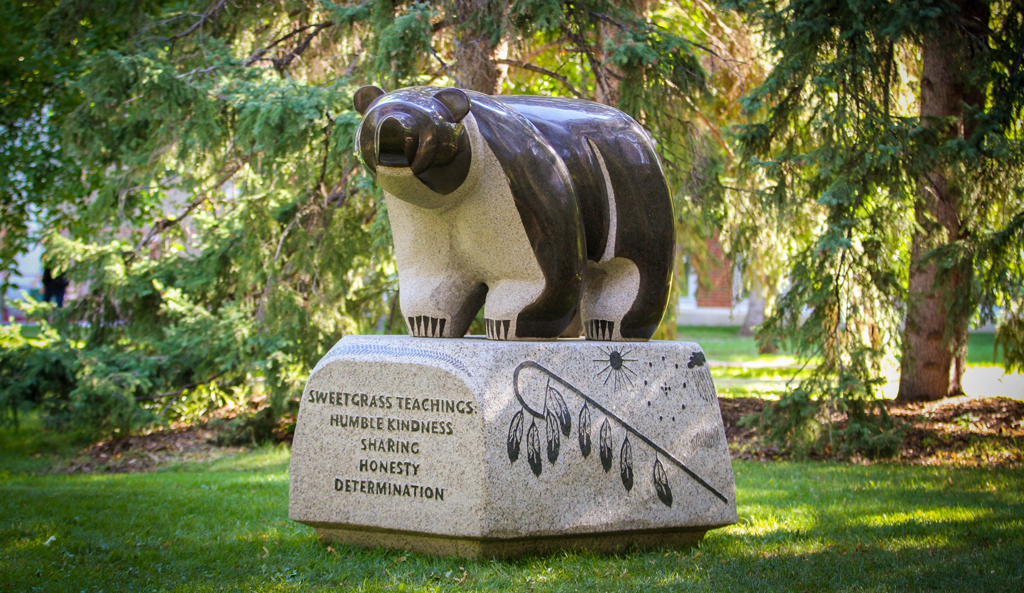
Photo courtesy of the Faculty of Native Studies, University of Alberta.
As Canada navigates its complex relationship with Indigenous people, settlers and their institutions have a responsibility to contribute to reconciliation.
The School of Public Health has taken steps to affirm its role in the process. In 2014, Dean Kue Young signed an affiliation agreement between the School and the Institute for Circumpolar Health Research in Yellowknife, Northwest Territories, which is under the direction of Associate Professor Susan Chatwood. The partnership enhances northern student recruitment efforts and provides research opportunities in the areas of health and well-being for northern populations, including Indigenous communities. And, in July, the School will welcome a new faculty member, Sherilee Harper, whose work focuses on Indigenous health in the context of climate change.
In responding to the unique challenges and opportunities of working "in a good way" with Indigenous communities, the School is taking its next step to develop a formal response to the calls to action recommended by the Truth and Reconciliation Commission (TRC) in 2015.
"It is the responsibility of all Canadians to respond to the calls to action," said Jeff Johnson, professor and associate dean (education). "As a public institution for higher learning, we have a heightened responsibility to be leading in all efforts of public importance."
Johnson and Assistant Professor Stephanie Montesanti are leading a working group that includes Indigenous elders; University of Alberta faculty members; and School staff, faculty and Indigenous students to develop the strategy.
"Of the 94 calls to action, we have identified six that the School can impact directly," said Montesanti.
The two see the strategy as having three components: an Indigenous student recruitment plan; a focus on Indigenous research; and, an engagement piece to enhance the School community's understanding and respect of Indigenous knowledge, culture and ways of life.
Speaking in the context of residential schools, TRC Commissioner Chief Wilton Littlechild ('67 BPE, '75 MA, '76 LLB) has said that "education got us into this mess; education will take us out of it." The quote resonates with Johnson who believes the School can train future public health practitioners and researchers who better understand our country's history, and who can contribute to a more positive future for all Canadians.
Montesanti believes this can be achieved by offering more Indigenous-based courses and programs and by supporting community-based opportunities for research and learning in Indigenous health.
"Including Indigenous knowledge and practices alongside our own is part of de-colonization," explained Montesanti. She says, that also means building ethical and respectful relationships with First Nation, Métis and Inuit communities.
For Montesanti, that means incorporating ceremony, such as smudging and prayer, into her work. It's helped her build relationships of trust and respect with her Indigenous community partners. Not only has this made Montesanti a more respectful researcher, but she says it's made her a better person.
"Participating in ceremony has given me opportunities to examine my own life, and it's encouraged me in my personal growth."
This is the type of engagement the School's strategy will encourage through its newly established Elders-in-Residence program announced recently by Young.
In Indigenous culture, the role of elders is to be knowledge keepers and guides. Elders Be'sha Blondin, a Sahtu Dene, and Rassi Nashalik, an Inuk, are based in Yellowknife and will provide guidance on incorporating traditional knowledge and values into the School's planning and programming for students studying and conducting research in the North. Bert Auger, a Cree elder, will be working with the School community on its Edmonton campus.
Young also announced the appointment of five Indigenous adjunct professors based in Yellowknife. Sharon Firth, Jim Martin, Denise McDonald, Francois Paulette and John B. Zoe will participate in orientation sessions, co-supervise graduate students and lecture on a variety of topics to faculty, staff and students.
Montesanti says the strategy also needs to include providing resources and learning opportunities for the entire School community-staff, faculty and students-to recognize, challenge and change biased thinking and practices rooted in colonialism.
"We all have a responsibility, especially so in public health, to be allies in removing the barriers that create inequities between Indigenous and non-indigenous Canadians, and to close the gap."
This is inherent in the spirit of public health.